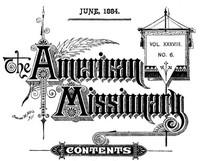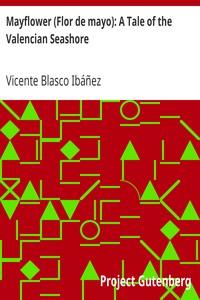|
|
Read this ebook for free! No credit card needed, absolutely nothing to pay.Words: 26300 in 6 pages
This is an ebook sharing website. You can read the uploaded ebooks for free here. No credit cards needed, nothing to pay. If you want to own a digital copy of the ebook, or want to read offline with your favorite ebook-reader, then you can choose to buy and download the ebook.

: The American Missionary — Volume 38 No. 06 June 1884 by Various - Congregational churches Missions Periodicals; Home missions Periodicals The American Missionary@FreeBooksWed 07 Jun, 2023 elt the importance of this new way, and that he wished for himself and his people schools and churches. This was encouraging, but as the evening came on there set up a hideous noise; a dance was in progress, and all night long a relay of three Indians kept up the hideous and monotonous tom-tom of their kettle-drums, while the shrill scream of the women pierced the air. The next morning were things equally painful. A young Indian woman, with four children to care for, put away by her cruel husband for another wife, came to beg the missionary's influence to secure for her Government rations. A tent hard by was visited, where the family, in accordance with Indian superstitions, were gathering, and had been for a year or two, all sorts of valuable articles for presents in honor of some deceased member of the household, intending by-and-by to distribute all these things, leaving themselves beggared. And last of all, in a neighboring village were seen three men and a boy, clad with a few feathers in their hair, and yellow ochre on their bodies, going through mummeries in the sight of a large company. They were "making mystery," whatever that may be. At Standing Rock were Sitting Bull and Chief Gall, with their bands. Not many years ago they had been on the war path; they were concerned in the Custer massacre; but now they are in wholesome awe of the Government and dependent on Government favor for daily bread. Consequently they are orderly and peaceable, and though a few years since it would have been dangerous for three unarmed men to pass through their reservations, it was perfectly safe last summer for a missionary speaking the Indian language and his friends. A third class of Indians was found at Fort Berthold. This reservation is a hundred miles north of Bismarck, Dakota Territory, on the east side of the Missouri. There are three small tribes combined in one large village for protection against their ancient enemies the Sioux, namely, the Arickarees, the Mandans, and the Gros Ventres. These Indians have latterly made great advances in civilization. They have 800 acres under cultivation, all looking admirably and well fenced in, and they are taking great pride in their work and asking for more land to cultivate. They have comfortable homes, or "lodges," as they are called, made in an octagonal form, of logs completely covered with earth. They are eagerly obtaining from the Government such comforts of civilization as they can--reapers, cooking-stoves, baking-powder, and the like. And yet this people display some of the grossest elements of savagery. Polygamy is common. The disgusting scaffold burials still go on, and the air in the neighborhood of the village is sometimes foul from the adjacent cemetery. Buffalo heads and poles with red streamers, as offerings or invocations to spirits, surmount many of the lodges and bear witness to the heathenism of the people. Many of the men are terribly scarred on the shoulders, breast and arms with the cruel practices of the sun dance. Men and women alike wear the dress of their savage life. There has been as yet little success from schools or church work. Few care for schools, and the attendance at the mission chapel is not large. The fault, however, is not with the devoted missionaries, Rev. C. L. Hall and his helpers of the American Missionary Association, whose faithfulness is unsurpassed, but with bad white men who visit the village. For years these Indians have been brought in contact with some of the worst influences of civilization, and in consequence the women have become gross, the men have lost their sense of honor, and the people are manifestly more degraded and harder to reach than the wild Indians on the Sioux Reservation. After observation of these three types of Indians, the Christianized, the wild and the polluted, certain conclusions were inevitable. Two other cuts represent groups of school-children at Santee, all Indians. The artist has not exaggerated the bright and attractive look upon their faces. They come from all parts of Dakota and the Santee Reservation. In the ninth cut is represented an Indian who, with a white man's shirt, retains his native leggings, blanket, necklace and tomahawk. FORTY-FIVE YEARS IN WASHINGTON TERRITORY. From August 1838, to Sept., 1883, a period of more than 45 consecutive years, I was a resident of what is now Oregon and Washington Territory. I spent the greater part of those years in what is included in Washington Territory. I was employed during the first ten years in mission work under the patronage of the American Board in behalf of the Spokane Indians. In July of that year I, as agent of the A. B. C. F. M., went to Walla Walla to look after their interests. Standing beside the grave of the distinguished patriot and martyr, Dr. Whitman, I purposed to attempt the erection of a monument to his memory in the form of a school of high Christian character. The following Spring, 1860, I commenced work in fulfillment of the plan named. During the next 12 years the execution of that plan was with me all-controlling. In pursuance of said object I recently returned to my native New England. During my sojourn in Walla Walla from 1860 to 1872 I was favored with opportunities for the measurable prosecution of evangelistic work among the Spokane Indians. In May, 1872, my house at the place formerly occupied by Dr. Whitman was consumed by fire. My elder son had previously been nominated by the American Missionary Association as Indian agent and confirmed by Government. Previous to his taking charge the Lord's day had been distinguished for the performance of outlandish wickedness. With the new agent there was change of employ?s. A weekly prayer meeting was appointed and conducted. With a good degree of constancy it has been continued to the present time. A Sunday-school was organized. It is continued with sustained interest. Free books android app tbrJar TBR JAR Read Free books online gutenberg More posts by @FreeBooks
: Rural Hygiene by Ogden Henry N Henry Neely - Sanitation Household; Rural health@FreeBooksWed 07 Jun, 2023

: An Ethnologist's View of History An Address Before the Annual Meeting of the New Jersey Historical Society at Trenton New Jersey January 28 1896 by Brinton Daniel G Daniel Garrison - History@FreeBooksWed 07 Jun, 2023
|
Terms of Use Stock Market News! © gutenberg.org.in2025 All Rights reserved.






